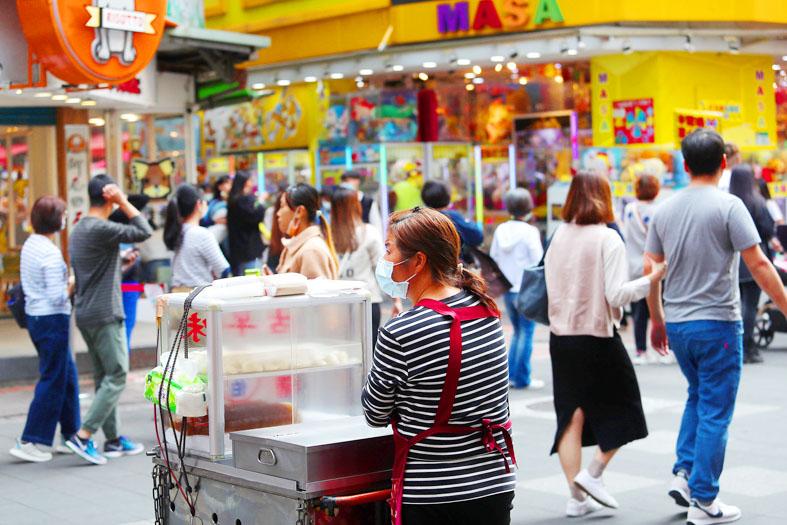The government’s business climate monitor last month was “red” for the first time in a decade, as the economy is heating up due to strong demand for tech and non-tech products, as well as a low comparison base last year.
The monitor gained 3 points to 40, the highest in 32 years. Officials shrugged off bubble and inflation concerns, saying the “red” signal came on the back of solid economic fundamentals.
“Robust exports, private investment and consumer spending accounted for the boom that had nothing to do with bubbles or drastic inflation,” National Development Council (NDC) Deputy Minister Kao Shien-quey (高仙桂) told a media briefing.

Photo: CNA
The council uses a five-color system to portray the nation’s economic state, with “green” indicating steady growth, “red” suggesting overheating and “blue” signaling a recession. Dual colors indicate a transition.
Many have voiced concerns about potential economic bubbles, as COVID-19 infections remain high in many parts of the world, while some research bodies have warned that central banks could reverse loose monetary policies early to rein in inflation risks.
The government has been closely watching international raw material price movements and believes that the price hikes so far are benign, Kao said.
Although Taiwan’s GDP growth this year is forecast to reach 4.64 percent, the central bank last week said it would stand by its current accommodative monetary policy in line with its global peers for fear that a rate hike would attract hot money.
NDC Minister Kung Ming-hsin (龔明鑫) had earlier told lawmakers that the government might consider tightening measures if the boom extends into the second half of this year.
Isolated “red” signals pose no threat, Kung said.
The COVID-19 pandemic started in January last year, weakening economic growth over the following several months, but things started to improve in the second half.
The index of leading indicators, which aims to portray the economic situation for the next six months, picked up 0.52 percent to 106.69, as gauges on imports of semiconductor capital equipment, manufacturing business confidence and labor entry rates all pointed upward, the council said.
However, readings on export orders and new construction floor areas slipped from one month earlier due to unfavorable holiday effects.
The index of coincident indicators, which reflects the current economic state, grew 1.35 percent to 106.8, with markers such as power usage, retail sales, manufacturing sales and restaurant revenue all gaining value due to business improvement, the council said.
Non-farm payrolls and exports declined from a month earlier, as there were fewer working days last month.
Major tech firms are upbeat about their business this month and beyond, lending support to the economic boom.

South Korea’s equity benchmark yesterday crossed a new milestone just a month after surpassing the once-unthinkable 5,000 mark as surging global memory demand powers the country’s biggest chipmakers. The KOSPI advanced as much as 2.6 percent to a record 6,123, with Samsung Electronics Co and SK Hynix Inc each gaining more than 2 percent. With the benchmark now up 45 percent this year, South Korea’s stock market capitalization has also moved past France’s, following last month’s overtaking of Germany’s. Long overlooked by foreign funds, despite being undervalued, South Korean stocks have now emerged as clear winners in the global market. The so-called “artificial intelligence

Chinese artificial intelligence (AI) start-up DeepSeek’s (深度求索) latest AI model, set to be released as soon as next week, was trained on Nvidia Corp’s most advanced AI chip, the Blackwell, a senior official of US President Donald Trump’s administration said on Monday, in what could represent a violation of US export controls. The US believes DeepSeek will remove the technical indicators that might reveal its use of American AI chips, the official said, adding that the Blackwells are likely clustered at its data center in Inner Mongolia, an autonomous region of China. The person declined to say how the US government received

‘SEISMIC SHIFT’: The researcher forecast there would be about 1.1 billion mobile shipments this year, down from 1.26 billion the prior year and erasing years of gains The global smartphone market is expected to contract 12.9 percent this year due to the unprecedented memorychip shortage, marking “a crisis like no other,” researcher International Data Corp (IDC) said. The new forecast, a dramatic revision down from earlier estimates, gives the latest accounting of the ongoing memory crunch that is affecting every corner of the electronics industry. The demand for advanced memory to power artificial intelligence (AI) tasks has drained global supply until well into next year and jeopardizes the business model of many smartphone makers. IDC forecast about 1.1 billion mobile shipments this year, down from 1.26 billion the prior

FORTUNES REVERSED: The new 15 percent levies left countries with a 10 percent tariff worse off and stripped away the advantage of those with a 15 percent rate In a swift reversal of fortunes, countries that had been hardest hit by US President Donald Trump’s tariffs have emerged as the biggest winners from the US Supreme Court’s decision to strike down his emergency levies. China, India and Brazil are among those now seeing lower tariff rates for shipments to the US after the court ruled Trump’s use of the International Emergency Economic Powers Act to impose duties was illegal. While Trump subsequently announced plans for a 15 percent global rate, Bloomberg Economics said that would mean an average effective tariff rate of about 12 percent — the lowest since